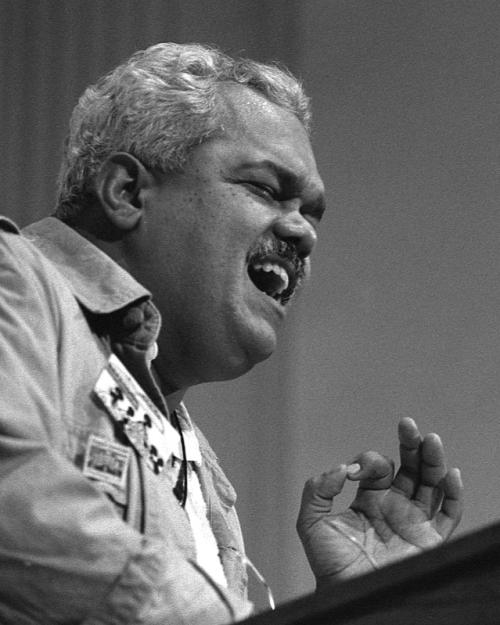From 2003 to 2005, scholar and poet Karen Jaime ’97 hosted the Friday Night Poetry Slam at the famed Nuyorican Poets Cafe on New York City’s Lower East Side, a center for countercultural art. On Oct. 8, she was at the mic again, to celebrate the late Miguel Algarín, who co-founded the cafe as a salon in his East Village apartment in 1973.
The event served as the book launch for “Memorias de Miguel: The Hard Work of Love,” a print and digital anthology co-edited by Jaime, assistant professor of performing and media arts and Latina/o studies in the College of Arts and Sciences.
“Miguel’s use of prose and poetry to name, document, and celebrate the Nuyorican [New York Puerto Rican] experience and its alignment with the sociocultural and political movements of the late 1960s and 1970s, moved me then and it continues to inspire me now,” Jaime wrote in an essay in the anthology. “I had never met anyone like him before and I don’t know if I ever will again.”
The anthology was inspired by Jaime’s ongoing collaboration with Lois Elaine Griffith, one of the Nuyorican founding poets, and the Nuyorican Poets Cafe Founders Archive Project, which Griffith initiated. Jaime has researched the cafe, as well; her award-winning book, “The Queer Nuyorican: Racialized Sexualities and Aesthetics in Loisaida” led to a (virtual) Mellon /HIDVL Fellowship for 2022.
With Griffith, Jaime was able to curate the first ever digital archive documenting Nuyorican Poets Cafe history and performance from the mid-1970s to the early 2000s, for the Hemispheric Institute of Performance and Politics at New York University’s Digital Video Library. “Memorias de Miguel” grew out of this work.
The College of Arts and Sciences spoke with Jaime about the book.
Q: How was the Oct. 8 reading at the Nuyorican Poets Cafe a fitting launch for this book?
A: A celebration of the life and legacy of Miguel Algarín needed to happen in a space that he helped to found and that was emblematic of his commitment to the writing and performance of people too often left out of the literary and artistic “canons.” The cafe is the physical and affective structure reflecting his life’s work.
Q: Reading piece after piece in this anthology, a complex portrait of Miguel emerges. Why is it important to memorialize Miguel, both for those who knew him and the Nuyorican Poets Cafe, and for those who are learning about him for the first time now?
A: Miguel Algarín’s life and legacy need to be remembered and memorialized because of his cultural, social and artistic contributions. He made clear to us who knew him, both personally and through his work, the importance of making your voice count. He intervened in discourses seeking to articulate firm boundaries of what constitutes high and low art, by pushing for a writing and performance of literature that reflected a language usage highlighting the experiences and subject positions of marginalized communities.
Q: The online version of the anthology includes recordings of each essay, poem and remembrance. Why did you and the other editors decide to include the audio element?
A: “Memorias de Miguel: The Hard Work of Love” is available in both a print and digital format because we wanted to make it more easily accessible to everyone. In addition, we wanted to highlight the particularities of language usage. While reading a poem or submission enables readers to see the words on the page, we wanted to also enable them to hear the pauses, the verbal articulations, the rise and fall of the author’s voice, and the feelings being expressed. We wanted them to experience the submissions in ways that the visual text does not allow for.
Q: In your personal experience, what about Miguel made him absolutely unique?
A: His unwavering commitment to “the word,” capital “T” capital “W.” During my last visit with him, although his health was declining, he was brainstorming possible writing workshops with me, trying to figure out ways to provide access and opportunities for people from different socio-cultural and economic subject positions to share their stories. He was definitely one of a kind.
Read the story in the Cornell Chronicle.




